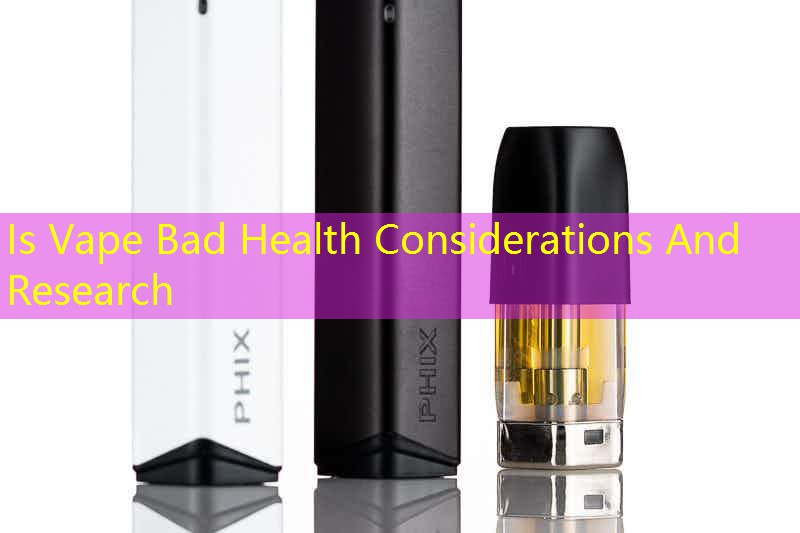Is Vape Bad Health Considerations And Research
Introduction: Understanding Vape and its Health Implications
In recent years, vaping has emerged as a popular alternative to traditional smoking. Many individuals believe that electronic cigarettes are a safer choice, leading to increased usage among various age groups. However, with this rise in popularity comes a growing concern regarding the health implications of using vape products. This article explores the health considerations, relevant research findings, and the potential risks associated with vaping, providing a comprehensive understanding of this modern trend.
What is Vaping? A Brief Overview
Vaping refers to the act of inhaling vapor produced by an electronic cigarette (e-cigarette) or vaporizer. These devices heat a liquid—often containing nicotine, flavorings, and other chemicals—into an aerosol that users inhale. Unlike traditional cigarettes, which burn tobacco, vapes offer a smoke-free experience, leading many to perceive them as a less harmful alternative. However, the simplicity of vaping can obscure underlying health risks.
Health Risks Associated with Vaping

While some studies suggest that vaping may be less harmful than smoking traditional cigarettes, it is not without risks. The following are key health considerations related to vaping:
Nicotine Addiction
One of the primary concerns surrounding vaping is nicotine addiction. Many e-liquids contain nicotine, which is highly addictive and can lead to a variety of health issues. Nicotine affects brain development in adolescents and can increase the risk of mood disorders and impulse control problems.
Respiratory Issues
Vaping can also lead to respiratory problems. Research has indicated that inhaling vapor can cause inflammation and damage to lung tissue. A study revealed that prolonged exposure to e-cigarette vapor could result in chronic bronchitis symptoms and other pulmonary issues.
Presence of Harmful Chemicals
Many e-liquids contain harmful chemicals such as diacetyl, which is linked to “popcorn lung,” a serious lung condition. Additionally, other substances found in vape products, including heavy metals from heating elements and ultrafine particles, pose serious health risks when inhaled.
Research Findings: What the Studies Say
Numerous studies have focused on the health effects of vaping. A systematic review of existing literature found that while e-cigarettes may expose users to fewer harmful substances than traditional cigarettes, they are not risk-free. The following table compares traditional cigarettes with vaping in terms of chemical exposure and health risks.
| Health Consideration | Traditional Cigarettes | Vaping |
|---|---|---|
| Nicotine Addiction | High | Moderate |
| Presence of Carcinogens | Multiple | Fewer |
| Respiratory Damage | Yes | Possible |
| Cardiovascular Risks | High | Potential |
Vapping Among Young People: A Growing Concern
The use of vape products among young individuals has raised alarm bells among public health officials. The allure of flavors and the perception that vaping is safer than smoking have contributed to increased usage among teens. A survey reported that nearly 25% of high school students had vaped in the past month. This trend emphasizes the need for targeted educational campaigns to inform young users about the associated risks.
Guidelines for Responsible Vaping
If individuals choose to vape, it is crucial to follow certain guidelines to minimize health risks:
Choose Quality Products
Opt for reputable brands that provide transparency regarding their ingredients. Avoid products with questionable additives or unverified sources.
Be Aware of Nicotine Levels
Select e-liquids with lower nicotine concentrations to reduce the risk of addiction. Gradually decreasing nicotine intake can help in quitting altogether.
Stay Informed
Keep up with the latest research on vaping and its health implications. Being aware of new findings can lead to informed decisions regarding vaping habits.
Frequently Asked Questions About Vaping
Is vaping safer than smoking cigarettes?
While vaping is often perceived as a less harmful alternative to smoking, it is not without risks. Vaping can still expose users to harmful chemicals and potential health issues.
Can I become addicted to vaping?
Yes, many vape products contain nicotine, which is highly addictive. Users may develop a dependency on nicotine, leading to various health implications.
Where can I purchase quality vape products?
High-quality vape products can be purchased through specialized online retailers and local vape shops. Always choose reputable sources to ensure safety and quality.
In conclusion, vaping continues to be a subject of debate in health communities. The potential health risks associated with vaping cannot be overlooked, and it is essential for users to make informed decisions based on research and guidelines.





